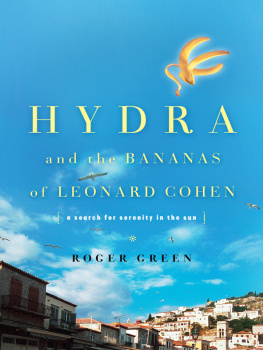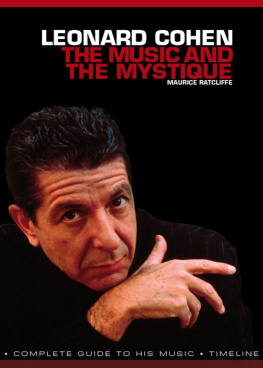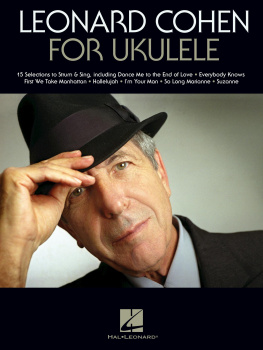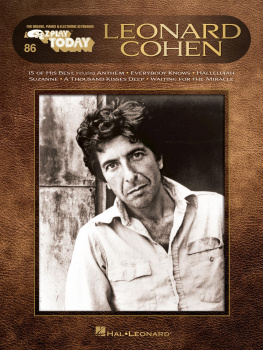HYDRA
and the BANANAS of
LEONARD COHEN
Also by Roger Green
Small Oxford Books: The Train
(Oxford University Press, 1982)
Notes from Overground by Tiresias
(Paladin Books, London, 1984)
Translation of The Akathistos Hymn by Romanos the Melodist
(The Ecumenical Society of the Blessed Virgin Mary, 1987)
Wolvercote Dreaming
(Shoestring Press, Nottingham, 1996)
With It Or On It
(Studio Viriditas Productions, Hydra, 2000)
HYDRA
and the BANANAS of
LEONARD COHEN
(A Greek parabola for us all)
Roger Green
Copyright 2003 by Studio Viriditas Productions
Published by Basic Books
A Member of the Perseus Books Group
This book contains magical stuff. Names, places, incidents, and characters, including a putative author, are either products of imagination or not. Any synchronicities are entirely coincidental.
All rights reserved. Printed in the United States of America. No part of this book may be reproduced in any manner whatsoever without written permission except in the case of brief quotations embodied in critical articles and reviews. For information, address Basic Books, 387 Park Avenue South, New York, NY 10016-8810.
Books published by Basic Books are available at special discounts for bulk purchases in the United States by corporations, institutions, and other organizations. For more information, please contact the Special Markets Department at the Perseus Books Group, 11 Cambridge Center, Cambridge MA 02142, or call (617) 252-5298, (800) 255-1514 or e-mail .
Library of Congress Cataloging-in-Publication Data
Green Roger, 1940
Hydra and the bananas of Leonard Cohen : (a Greek parabola for us all) /
p. cm.
Includes bibliographical references.
ISBN 0-465-02759-8 (alk. paper)
eBook ISBN: 9780786746927
1. Green, Roger. 2. Cohen, Leonard, 1934 . 3. Hydra Island
(Greece)Description and travel. 4. Authors, English20th
centuryBiography. I. Title.
CT1118.G74A3 2003
818'.603dc21
2003007427
Text design and composition by Trish Wilkinson
Set in 12-point Goudy
03 04 05 / 10 9 8 7 6 5 4 3 2 1
For
The Mistress of American Math
and
The Master of American Haiku
PROTEROGRAPH
My mind so muddled
I think everything
must have a hidden meaning.
Steve Sanfield
The heterogeneous nature of the material
reviewed in the preceding pages need
cause the reader no uneasiness.
Mircea Eliade: The Myth of the Eternal Return
Prologue
O nce upon a time, in England, a mother used to take her small boy across the fields to Mrs. Mansells shop. The shop was in the front room of Mrs. Mansells red-brick detached house. It never seemed like a proper shop, and Mrs. Mansell never seemed like a proper shopkeeper. Shopping involved a lot of conversation in lowered voices and something to do with a gray book with a crown on it. The boy, whose name was Roger, used to get bored and fidgety.
One day Mrs. Mansell whispered to Rogers mother that she had a special consignment of bananas. Rogers mother produced her gray book with the crown on it and flourished it at Mrs. Mansell. She said something like: Roger needs bananas. The vitamins are very important for him at his age.
Roger knew his mother was making a serious mistake. She must have forgotten that he had once eaten a banana and that the combination of the dead taste and the blotting-paper texture had made him sick.
Mummy! he shouted. You know I dont like bananas.
Much to his bewilderment, his mother cuffed him round the ear, told him he was a naughty little boy, and remained in a bad mood all the way home across the allotment footpath. She wouldnt even let Roger go and play in the aeroplane dump.
Roger wished his father would come home more often.
Introduction
N ancy Drew says I have written a story, and if Nancy Drew says I have written a story, then that must be what I have written. Nancy Drew has had at least one novel published, so she should know.
Steve Sanfield is a professional storyteller. He attends storytelling conventions. He gets paid to stand up and talk for hours about the time he drove 40,000 turtles across the Midwest, or the time he kept a pet ant and learned its language. I am not that kind of narrator. For a start, I seldom get paid.
My father was known as a raconteur. People used to come up to me and say: Your father is the finest raconteur I have ever heard. These people were usually businessmen. My father used to sell them advertising space over expense-account lunches. At home my mother and my father would sometimes invite people to dinner. Often lively conversations would develop. The meaning of life would seem to be only just around the corner when my father would suddenly and loudly cut in, saying: Now, that reminds me of a story. He would then hold the floor for the next fifteen minutes or so, very often with a story that had been told to him by somebody else over one of his business lunches. As I cringed inwardly, I vowed that I would never become that kind of raconteur.
I once worked for ten years for the Ministry of Defence. After I left, I tried to write a novel based on my experiences. I wasnt happy with it. Life is so extraordinary that I can never see the point of inventing characters and situations that have never existed, or of pretending that real people and events are really fictional. Crazy. Being a moderately law-abiding person, I dutifully sent the first hundred pages or so to my former employers, seeking their imprimatur. I was honestly relieved when their reply came, saying: We wish you well writing on another subject. I dont believe I had infringed the Official Secrets Act. But I believe that They could not forgive me for betraying a different kind of secret namely, that what goes on inside the Ministry of Defence is Not Serious. Be that as it may, it was clear that I was not that kind of tale-spinner either.
I write poetry and verse, notebooks and discourses. Never have I set out to write a story. Nevertheless, people have attempted to film my notebooks, while others have said: I liked your story after reading or hearing one of my poems. All I intended to do this time was to present a short poem of mine as an entertainment for my friends, on the occasion of my fifty-seventh birthday, in the small square that is a natural street-theater outside my favorite restaurant, the Pyrofani (in the area known as Kamini on the Greek island of Hydra), run (after a fashion) by my dear friend Theo, who must be unique among great restaurateurs in that his highly deserved reputation does not rest on his cooking abilities.
The poem was to be a throwaway piece summarizing my life (a tad cryptically) since I had come to the island as an English teacher four years previously. I was becoming known and even tolerated as the bard of the Pyrofani. I produced verses for birthdays, for the opening and closing of the restaurant, for other occasions. There was no reason to suppose that this poem would be any less ephemeral. What happened? Or rather, what has happened and is continuing to happen?
When a few friends who had been present at the first rendition of Fun de Sicle (as I called my ditty, partly with reference to the end of an epoch in my own life, partly with a nod toward the approaching millennium, and partly to stress my own philosophy that humor is an essential ingredient of everything) requested photocopies of the text, I complied, but I thought it would be helpful to add half a dozen pages of notes.











